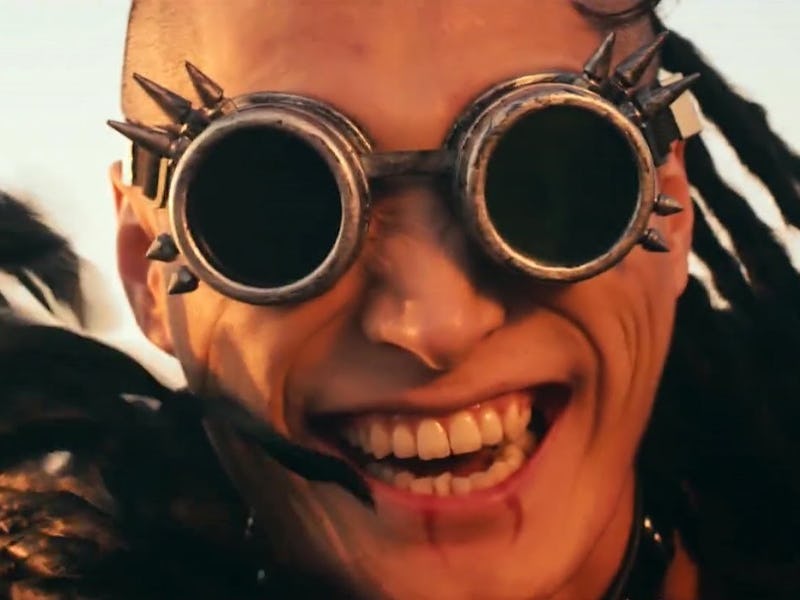China's 'Mad Max' Ripoff and the End of the Mockbuster Dystopia
American law protects parodies. Chinese law doesn't.

With its graphic violence, post-apocalyptic bikini party aesthetic, and anti-authoritarian themes, last year’s Mad Max: Fury Road had no chance of clearing the self-serving moral and political standards by which the Chinese governments State Administration of Press (SAPPRFT) judges foreign movies. And so, the Oscar-winning hit never made it to theaters in China. Now, Mad Sheila, a gender-swapped knockoff produced by New Film Media, is banking on an audience’s hunger for western-style films to become an easy streaming hit. The trailer may have gone viral in America, England, and Australia because the imitation feels like an insincere and opportunistic form of flattery. And while the film does seem amateurish, it also offers a perfect snapshot of this moment in Hollywood’s give-and-take relationship with the Chinese film industry.
Chinese money is flooding into Hollywood, and that means that while American studios don’t have much power to shut these sorts of mockbusters down domestically, they may, ironically, have more sway to extinguish them in China.
The financial ties run deeper every day, but perhaps the most prominent influence purchases include Chinese Mega-corporation Dalian Wanda acquisitions of AMC Theaters, blockbuster factory studio Legendary Pictures, and Dick Clark Productions. The company also plans to invest in the film slates all six major studios, giving them stake in the success of a majority of big budget films. Meanwhile, a Chinese state-run company called Hunan Television owns a big stake in Lionsgate, and a group named Tang Media Partners owns IM Global, the great Hollywood financier.
Diving in further, Tang is backed by Tencent Media, which is where Mad Sheila comes into play, because it is streaming on the Tencent platform. Mad Sheila’s director, Lu Lei, has made no secret of his film’s indebtedness to Miller’s blockbuster, but Tencent’s growing relationship with Hollywood could make backing such a blatant knockoff a problem going forward.
China is due to increase the number of films it imports next year (it already loosened its tight cap of 34 this year due to domestic box office struggles), and its growing control over Hollywood’s products means that at some point, mockbusters will only start hurting the bottom lines of Chinese companies. And to them, that’s more important than free speech.
The filmmakers behind Mad Sheila embraced Miller’s auteurish steampunk vision. The poster for the film looks like a gang of friends in cosplay and the film relies on a similar dystopian aesthetic. But Sheila exchanges savage violence and political commentary for a lot of silly action and cheesy lines. These are necessary changes in China, where SAPPRFT just tightened both domestic and foreign film guidelines, which demand that movies “promote the core values of socialism,” or, in some cases, at least not provide a rebuke of the government. In the case of Mad Max, China banned the movie from theaters, and while it was available on streaming, there was clearly an appetite for a safer, homebrew version of it, which could be given far more promotion. But this process is not unique to controversial films. This summer, Crazy Toy City, a ripoff of Disney’s hit Zootopia, made waves on the internet. There was also a Warcraft ripoff film this spring, as well as a fully unauthorized Warcraft theme park in Changzhou.
America has its own tradition of “mockbusters.” Small production companies rush to make awful knockoffs of giant studio blockbusters, and hope that similar home video box art will trick unsuspecting audiences into buying ripoffs. Atlantic Rim, The Da Vinci Treasure and Age of Hobbits are just a few of these masterpieces, which are protected in the United States by parody laws.
'Mad Max: Fury Road' vs 'Mad Sheila'
The laws are a bit murkier in China with regards to both copyright and the rights of American movie studios. After years of explosive growth, the box office there has suffered a significant slowdown, in part because movie theaters and studios have stopped subsidizing ticket purchases. And yet, the country continues to build movie theaters — China is up to 40,000, on par with the United States — and both production companies and distributors are landing ever-larger financing deals.
Mockbusters like Mad Sheila are only available online, and that is “a bit of a wild west market,” Fergus Ryan, a reporter for China Film Insider, told Inverse. There are fewer restrictions on films that don’t hit the big screen in China, but they are not exempt from the long reach of the government’s censorship laws. Early in November, the Chinese government ordered the removal of 60 films from streaming services because of what was deemed vulgarity and violence.
And so, while Hollywood has long worked to soften its movies so that they can pass muster with those censors, it may perversely be able to rely on the Chinese government’s iron fist to protect its intellectual property. To bank on the restriction of free speech marks a sad state of affairs, but it must relieve studios to know that at some point, it’s likely that at least Chinese consumers won’t be fooled by counterfeit mockbusters.